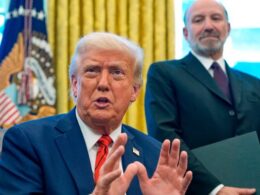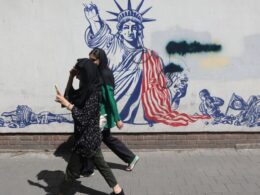Unlock the White House Watch newsletter for free
Your guide to what Trump’s second term means for Washington, business and the world
Romania’s presidential election will take place on May 4, with a run-off scheduled for May 18, as voters head to the polls for the second time in six months following November’s cancelled election.
Sunday’s vote will mark the start of one of the most contentious and unpredictable political events in the country’s post-Communist history. As Moscow, Washington and EU capitals weigh in on the election and the controversy surrounding it, here is everything you need to know about the people, polls and geopolitics that will shape Romania’s presidential rerun.
Polling
George Simion, the far-right leader of the Alliance for the Union of Romanians (AUR) who has vowed to “Make Romania Great Again”, is expected to win Sunday’s vote. His bid has been boosted by the endorsement of Călin Georgescu, the controversial figure at the centre of November’s election annulment accused of benefiting from Russian interference.
Georgescu was barred from running for office again in March following an investigation into alleged illegal campaign financing and attempts to undermine the democratic order. He denies wrongdoing and has described the probe against him as “tyranny”.
With days to go before the first round, Simion is currently leading the opinion polls but is projected to fall short of the 50 per cent threshold needed to secure the presidency outright — opening the path for a centrist pro-EU challenger to win in the second round.
The main candidates

Far-right candidates have typically struggled to top voter surveys in recent Romanian history, but strong polling has not always guaranteed election success.
In November, Simion finished fourth despite a predicted second place in opinion polls, while Georgescu’s first-round victory went largely unnoticed by pollsters. Nevertheless, Simion’s lead in pre-election polls is unprecedented.
Pro-EU centrists Crin Antonescu and Nicuşor Dan are battling it out for a place in the run-off, with Antonescu polling slightly ahead of Dan.
Elena Lasconi, who qualified for last year’s cancelled run-off against Georgescu, is polling in the single digits and has lost the support of her party, which has urged her to drop out in favour of Dan.
Victor Ponta, a former Social Democrat prime minister and self-styled “Maga” candidate, has re-emerged as a dark horse. Once a disgraced politician, he has spent the past 10 years on the political sidelines.
A total of 11 candidates are in the race.
Run-off scenarios

Romanian pollster FlashData on Monday projected that Simion would win the first round of the vote with 29 per cent, followed by Antonescu with 26 per cent and Dan with 23 per cent.
The survey also included five scenarios for the May 18 run-off. Antonescu was expected to win against Simion by 4 percentage points, the pollster said. But when matched against Dan, Simion was projected to become president with a 5.5 per cent advantage.
Analysts say that parts of Antonescu’s voter base may be more inclined to vote for “patriotic” Simion than “urban” Dan. Meanwhile, Dan’s supporters are expected to back Antonescu in the second round to prevent the far right from coming to power.
Antonescu would also win less probable run-offs against Dan and Ponta, according to FlashData.
Dan would emerge victorious in a match-up against Ponta, an online survey of 7,500 respondents of voting age carried out between April 24-26 found.
Romania’s cancelled election and what it means for Europe

The decision to cancel the election due to alleged Russian interference has landed Bucharest in the crosshairs of both Moscow and the US Trump administration.
Russian President Vladimir Putin has taken to ridiculing Romanian officials, while the US has decried the annulment, calling the move an attempt to circumvent democracy and suppress fringe political opinions.
A win for the Maga-style far right would bolster the ranks of Europe’s Russia-friendly populist leaders who oppose further support to Ukraine and seek to play up their ties with the Trump administration.
The prime ministers of Hungary and Slovakia, Viktor Orbán and Robert Fico, respectively, as well as Alice Weidel, the leader of the German far-right opposition are all seeking to ride the Maga wave while harbouring pro-Russian sympathies.
In recent months, Simion has sought to play down his hostility towards Kyiv, Nato and the EU — as his party is in the same political family with Italy’s rightwing premier, Giorgia Meloni, who is a staunch Ukraine ally.
But both Antonescu and Dan have warned that if they fail to win the presidency, Romania will become an unreliable ally playing into Putin’s hands.
Dan described the country’s foreign policy orientation as the “most important thing at stake after this election”, adding that only he or Antonescu would guarantee the country’s continued commitment to the EU and Nato.
Source link












